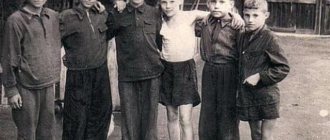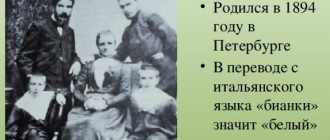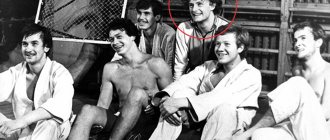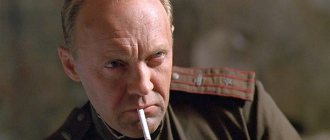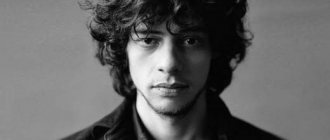The talented actress Natalya Rudnaya is familiar to many fans of Soviet-era cinema and theater. She is especially remembered for her roles in the opera film “Iolanta”, the historical drama “The Tsar’s Bride” and the melodrama “Autumn”, which was sensational in its time.
Despite the fact that audiences remember and love her work in theater and cinema, Natalya Rudnaya believes that the acting profession is not for her. She does not know how and does not want to make her way, and in acting, modesty is a big drawback. Journalists interviewing her usually get the feeling at the beginning of the meeting that Natalya Rudnaya is a very private person. But during the conversation it disappears. Instead, an understanding comes that it is simply not typical for her to evaluate the actions and actions of other people who are in one way or another connected with her and her life - from childhood, her upbringing instilled in her the principles that underlie the main trait of her character - internal decency.
Acquaintance
There is very little information about the actress. In the media you can find only very meager biography data, as well as a list of films and theatrical performances with her participation. Rudnaya Natalya Vladimirovna does not like to give interviews, and she also does not participate in television shows. The first association that arises when hearing the actress’s name is her wonderfully played leading role in the film “Autumn,” which shocked many in its time. I also remember her marriage to the famous director A. Smirnov. In addition, her daughter (the eldest) Dunya Smirnova, a TV presenter, screenwriter and film director, enjoys considerable fame. The last time Rudnaya Natalya Vladimirovna acted in a movie was in 2006, playing one of the small roles in the directorial debut of her daughter Avdotya - in the film “Communication”. When meeting with journalists, which happens very rarely, she asks not to ask personal questions.
Maria Solomina
Soviet film actress, fashion designer.
KinoPoisk: https://www.kinopoisk.ru/name/543494 IMDb: https://www.imdb.com/name/nm0813273
Maria Leonidova graduated from the Moscow Textile Institute (previously she studied at the Leningrad Higher Art and Industrial School named after Vera Mukhina). In 1970 she made her film debut in Pyotr Todorovsky’s film “City Romance” (Masha). Maria Leonidova received her first role by accident. At that time, she studied at “Mukha” - the Leningrad Higher Art and Industrial School named after Vera Mukhina - and dreamed of becoming an artist. Unexpectedly, an acting assistant met her on the street and made an appointment. At the audition for the film “City Romance” they met Vitaly Solomin, but in the end the main male role went to Evgeniy Kindinov. They liked each other immediately. On his next visit to Leningrad, Vitaly dragged her to the registry office, supposedly to submit an application. But since everything was agreed upon in advance, they were painted on the same day, and this event was celebrated in the apartment of Maria’s parents. We moved to Moscow, to a room in the Maly Theater dorm, only a few months after the wedding. Vitaly was afraid that the lack of amenities would frighten Maria, but she was delighted with the new housing. They lived in the very center of Moscow among creative bohemia, and she compared it with Montmartre and the parties of the Impressionist times. Maria transferred from Mukha to the Moscow Textile Institute and, after graduating, began working as an editor for a fashion magazine. And despite the fact that Maria Solomina is not a professional actress, she has starred in several films. And, also, in the film “Jump from the Roof” (1977), in the film “Sherlock Holmes and Dr. Watson. Getting Acquainted" (Miss Helen Stoner / Miss Julia Stoner, 1979) and in the musical "Silva" (Stassie, Countess Anastasia Egenberg, 1981) Maria plays with her husband Vitaly Solomin. The filmography of Maria Solomina for the period from 1970 to 2000 includes 9 films.
For some time she worked at the Operetta Theater. Then for several seasons she was an actress and costume designer at the Moscow Academic Maly Theater. Works at the House of Models, and also as a department editor at Fashion Magazine. My latest plans included working as an art director of one of the Moscow boutiques.
The Solomins' daughters have grown up long ago. The eldest, Anastasia (1973), danced in Igor Moiseev’s ensemble and successfully married a businessman. They have two sons: 17-year-old Kirill and 13-year-old Fedor. Elizabeth (1984). Now she is 29 years old, she graduated from the directing department of VGIK, where she studied on a course with Igor Maslennikov. After receiving her diploma, Elizaveta worked as a second director for Nikita Mikhalkov on Burnt by the Sun 2. She married a colleague, director Gleb Orlov. They have a son Ivan (2012) and a daughter Vera (2015).
Natalya Rudnaya: biography
The future actress was born on November 10, 1942 in Moscow. Her father is the famous Soviet journalist Vladimir Rudny. My mother was engaged in translations from German.
Natalya Rudnaya graduated from the Theater School named after. Shchukin. The course leader was L. M. Shikhmatov. After graduation, Natalya Rudnaya worked at the Maly Theater. In the late 60s, the actress became disillusioned with her profession and left the theater. In 1969 she gave birth to a daughter, Dunya, and in 1972, Alexandra. In 1973, director Andrei Smirnov made the film “Autumn”, Rudnaya Natalya played the main role. The film received a great response due to the presence of a sex scene in it, which was not accepted in Soviet cinema at that time.
Natalya Rudnaya, whose personal life was just as difficult as her career, after divorcing her husband, began working in the Russian drama theater in Estonia from 1981 at the CTSA. She left there in 2008.
Theater activities
Then Natalya Vladimirovna went to the Boris Shchukin Theater School, which she graduated in 1963. After college she began working at the Maly Theater. But after some time, the profession ceased to please Natasha, and she left the Maly stage and the cinema. And again, the parents were able to persuade their daughter, but on the contrary - not to quit her job. She decided to move to the Baltic states and began playing with her friend Natasha Zadorina on the stage of the Tallinn Russian Drama Theater.
But the acting profession is not for Natalya Rudnaya. She doesn’t know how and doesn’t want to make her way, and in such a profession this is a big drawback. But despite this, Natalya Vladimirovna is loved and remembered for her roles both in the theater and in cinema.
Filmography
Her soulful performance was remembered by the Soviet audience, although Natalya Rudnaya did not appear in films very often. It’s easy to list films with her participation. In 1963, the actress played the role of Iolanta in the opera film of the same name directed by. V. Gorikkera (opera roles performed by Galina Oleinichenko). In the same year, she performed one of the minor roles in the film directed by. B. Volchek “Employee of the Cheka.” In 1964, she played Lyubasha in “The Tsar’s Bride” (dir. V. Gorikker). In 1965, she played the role of Irina in the film directed by G. Gabai “Lebedev vs. Lebedev.” In 1967 she played Lydia in “The Rebel Outpost” directed by. A. Bergunker. In 1974, the actress played the main role of Alexandra Nikitina in the acclaimed film “Autumn” by her husband, director Smirnov. In 1983, in “The Mistress of the Orphanage” (dir. V. Kremnev) she played Elena Maksimova. In 2001, she performed one of the episodic roles in “Resort Romance” directed by. G. Gyardushyan, in 2006 she starred in the film “Communication” (the directorial debut of Avdotya Smirnova’s daughter).
Movie
The most significant film of the artist can be considered the film “Autumn”. The heroines of the mid-seventies were beautiful, sophisticated women. They put up with loneliness and at the same time cannot forgive the vulgarity and selfishness of their chosen ones. The film is based on two opposite heroines with different approaches to life. The two Natalias played their roles brilliantly. Natalya Rudnaya and Natalya Gundareva.
View gallery
Natalya Vladimirovna herself does not consider her role and performance to be bright, because she was in constant tension. And the cameraman didn’t like her, and she was afraid to let her husband, the director, down. And the filming itself was unusual - with only one take. And this is very difficult. But all the experiences remained behind the scenes, and the viewer received an ageless film.
In 1981, Rudnaya became an actress at the Soviet Army Theater, from which she left in 2008. Her last role was played in the film “Communication.” This film is the directorial debut of Natalia's daughter. Famous actors such as Mikhail Porechenkov and Anna Mikhalkova took part in the film.
Theater works
Among Rudnaya’s theatrical works, it is worth noting the roles played by the actress at different times in TsATRA (Central Academic Theater of the Russian Army): Sofia Markovna - in the play “The Old Man”; Tani - “Clock without hands”; Margot - in the play “The Law of Eternity”; Ilona Chibor - in the production “My profession is a gentleman from society”; Alexandra - in the play “The Idiot”; Josephine - in the "Autumn Campaign of 1799"; Lee - in "Heat"; witches - in Macbeth; Luzgina - in “Nanny”; Raisa Ivanovna - in the play “Leningrader”; Empress Maria Feodorovna - in "Paul I"; Felicity - in "The Hunted Horse".
“...You can’t play something like that, it’s in the blood...”
This is how journalists reacted to her role in “Autumn.” The character of her heroine was defined by the audience as “intelligence itself.” Many understood that behind this was the special soul of the actress who played her. The audience was interested to know in what life circumstances such subtlety and insight is “forged.”
Natalya Rudnaya, a biography whose personal life was usually kept under seven locks, nevertheless somehow told journalists about herself.
Children
Natalya Rudnaya, whose biography was very interesting and fascinating, believes that the strongest relationship between a couple is precisely when it is built primarily on friendship. Love comes and goes, but friendship keeps people together.
The actress’s daughters grew up to be creative individuals. Elder Dunya is an author of articles and essays, film director, screenwriter, and TV presenter. The younger Alexandra makes her career in London. The girls are completely different in character. The older one is serious, and the younger one laughs.
View gallery
Currently, Natalya Vladimirovna is doing her favorite thing - writing short stories, which, by the way, enjoy some success among literature lovers. Some of her works have received well-deserved positive reviews from critics.
Her childhood
The father of the future actress, V. A. Rudny, before the war was a correspondent for the newspaper “Vechorka”, and then worked as editor of the popular magazine “Literary Moscow”.
Mom, according to Rudnaya, was also a fairly busy person. She translated from German and loved her profession very much. Mom studied at a literary institute, raised children, and at night she had to deliver bread in a van. The actress’s mother had a very difficult fate. Left without a mother at an early age, she experienced a lot during the war years because she was of German nationality. Such an entry in the passport was then tantamount to a sentence. When in 1941, the actress says, her father proposed to her mother, friends around her were perplexed, believing that he had gone crazy. In addition to her “dangerous” nationality, his chosen one had two children from her first marriage.
The family huddled in a communal apartment in the center of the capital. Neighbors systematically denounced my mother because of her nationality, demanding eviction. One day, a father who came from the front on leave had to defend his wife from the police who came for her, almost with weapons in their hands. Everything worked out thanks to the intercession of the local police officer.
When the children were still small, parents tried not to raise the topic of nationality. She was hidden, as in those days many people hid their belonging to the nobility, connections with the repressed, etc.
In their family album they came across incomplete, cropped photographs. Already during the Thaw, Rudnaya learned that her mother’s sister had been shot in 1937.
Parents were truly reliable friends for their children. Despite the fact that both were extremely busy with work, family always came first for them.
The presence in the house of Polya’s aunt, Pelageya Ivanovna Demkina, who lived in the family until her death, helped the children avoid the feeling of abandonment when their parents were so busy. She was called not a housekeeper, but “the most important person in the house.” From the age of twelve, the nanny worked in Moscow for noble families; she also had to serve on the estate of Leo Tolstoy’s brother. The woman was country-wise, intelligent, knew a lot of wise proverbs and sayings, and knew how to tell a wonderful story.
Biography of Vitaly Solomin. Causes of death. Funeral
Biography of Vitaly Solomin. Causes of death. Funerals - we will look at all this in this article. His life was full of different events, both good and not so good. After all, despite the fact that he was an actor, first of all he remained a man with a living heart that was capable of loving, suffering, and making decisions. The future actor was born in Chita, and his parents were directly related to the world of creativity. True, it was music, so from early childhood, the boy was able to instill a love of music and was taught to play the piano. But Vitaly didn’t really want to study music; he preferred various sports sections. He especially loved boxing. But his destiny was destined for him on the big stage.
At the end of the fifties, together with his older brother, Solomin went to Moscow to enter the theater school. He succeeded, throughout his studies, the guy studied responsibly, received good grades, and already in his second year he began to take part in performances. He was also an excellent literary reader; when he read classical passages, he was always listened to attentively. The actor’s filmography also evokes respect, because he starred in those films that people remembered, both for the plot and for the actors. He played in the film “Winter Cherry” and also performed well in the comedy musical “The Bat”. But he gained his greatest fame after playing Dr. Watson in the famous series about Sherlock Holmes. It is worth noting that it was the Soviet interpretation that was recognized in England as the best, which was very expensive both for the cinema and for the actors who were involved there.
The actor undoubtedly made a huge contribution to the development of Soviet cinema, but his life was relatively short. The fact is that Vitaly suffered from hypertension for a long time, the disease progressed, making itself felt as much and more acutely as possible. He felt sick right on stage where he went out, although he felt that his health was unstable. As a result, the actor was simply taken out of the theater and sent to the hospital. After this, Solomin fell into a coma, doctors fought for the life of the great actor for more than a month, they did everything they could to save him. Until his last minute of life, he was devoted to the theater, and crowds of people came to say goodbye to their idol. Vitaly Solomin was buried in Moscow at the Vagankovskoye cemetery.
Acting
Before the birth of her daughters, Natalya Rudnaya was quite active in films and occasionally worked on television. Everything worked out well for her at the Maly Theater, where she began working after college.
But overnight, as the actress admits, the profession suddenly stopped giving her pleasure and became monotonous and boring. Natalya Vladimirovna decided to devote herself to home and raising her daughters. Her parents convinced her not to give up acting, and Natalya Vladimirovna entered the Tallinn Theater. Her daughters came to Tallinn from Moscow, having memorized the play “The Arrogant Bunny,” in which the mother played some kind of animal.
Natalya Vladimirovna admits that she regrets choosing the profession of an actor. Acting is completely alien to her character, she says. Rudnaya does not like to break through at all, and in this case this is by no means an advantage. Modesty for an actor is rather a disadvantage.
In her youth, she was going to go into journalism, her father advised. Why does she need it: to write about Brezhnev? And besides, they would force her to join the party, but for ideological reasons she was not even a Komsomol member.
At one time I wanted to study to be a librarian (once I had the opportunity to work part-time in the library of a pioneer camp, which Natalya Vladimirovna recalls with great pleasure) - but somehow it didn’t work out.
Excerpt characterizing Rudnaya, Natalya Vladimirovna
The previously invisible horses became visible up to their tails, and a watery light was visible through the bare branches. Petya shook himself, jumped up, took a ruble from his pocket and gave it to Likhachev, waved, tried the saber and put it in the sheath. The Cossacks untied the horses and tightened the girths. “Here is the commander,” said Likhachev. Denisov came out of the guardhouse and, calling out to Petya, ordered them to get ready. Quickly in the semi-darkness they dismantled the horses, tightened the girths and sorted out the teams. Denisov stood at the guardhouse, giving the last orders. The party's infantry, slapping a hundred feet, marched forward along the road and quickly disappeared between the trees in the predawn fog. Esaul ordered something to the Cossacks. Petya held his horse on the reins, impatiently awaiting the order to mount. Washed with cold water, his face, especially his eyes, burned with fire, a chill ran down his back, and something in his whole body trembled quickly and evenly. - Well, is everything ready for you? - Denisov said. - Give us the horses. The horses were brought in. Denisov became angry with the Cossack because the girths were weak, and, scolding him, sat down. Petya took hold of the stirrup. The horse, out of habit, wanted to bite his leg, but Petya, not feeling his weight, quickly jumped into the saddle and, looking back at the hussars who were moving behind in the darkness, rode up to Denisov. - Vasily Fedorovich, will you entrust me with something? Please... for God's sake... - he said. Denisov seemed to have forgotten about Petya’s existence. He looked back at him. “I ask you about one thing,” he said sternly, “to obey me and not interfere anywhere.” During the entire journey, Denisov did not speak a word to Petya and rode in silence. When we arrived at the edge of the forest, the field was noticeably getting lighter. Denisov spoke in a whisper with the esaul, and the Cossacks began to drive past Petya and Denisov. When they had all passed, Denisov started his horse and rode downhill. Sitting on their hindquarters and sliding, the horses descended with their riders into the ravine. Petya rode next to Denisov. The trembling throughout his body intensified. It became lighter and lighter, only the fog hid distant objects. Moving down and looking back, Denisov nodded his head to the Cossack standing next to him. - Signal! - he said. The Cossack raised his hand and a shot rang out. And at the same instant, the tramp of galloping horses was heard in front, screams from different sides and more shots. At the same instant as the first sounds of stomping and screaming were heard, Petya, hitting his horse and releasing the reins, not listening to Denisov, who was shouting at him, galloped forward. It seemed to Petya that it suddenly dawned as brightly as the middle of the day at that moment when the shot was heard. He galloped towards the bridge. Cossacks galloped along the road ahead. On the bridge he encountered a lagging Cossack and rode on. Some people ahead - they must have been French - were running from the right side of the road to the left. One fell into the mud under the feet of Petya's horse.
About literary preferences
A lot of things are connected with books in her life. As Natalya Vladimirovna admits, she adored the classics all her life, and now she loves reading detective stories.
Although modern talented writers also give her pleasure. One of her latest reading discoveries is Zakhar Prilepin. I really like his books “Sin” and “Sankya”.
I also like Alexey Ivanov – his “The Geographer Drank His Globe Away.” The actress also loves Dick Francis for the positive charge that his books carry.
Husbands
About her husband, Sergei Alexandrovich Lukin, Rudnaya says: “not the current one, but the only one.” The couple have lived together for more than a decade.
Before meeting Lukin, Natalya Vladimirovna was married twice. Her first husband was the famous actor Vitaly Solomin, with whom she quickly divorced, not seeing eye to eye on family life. In his second marriage, with director Andrei Smirnov, the son of the famous Soviet writer S. Smirnov, two daughters were born.
The eldest, Avdotya, who was called the “household philosopher” in childhood, became a TV presenter and film director. Known as Dunya Smirnova. Now she is the wife of politician A.B. Chubais. The youngest, Alexandra, who was a big laugher in childhood, according to Natalya Vladimirovna, also grew up to be a mature creative person and is now building her career abroad.
With her third husband, as the actress admits, they have a lot in common. With Sergei, they not only live next to each other, but are always together in everything. They know how to listen to each other, it is very easy for them to communicate. According to Natalya Rudnaya, relationships between a man and a woman should be built not on love, but on friendship. Love can go away, but true friendship is what keeps people together. She considers Sergei Aleksandrovich Lukin, her husband, a true friend. He came to their family at a difficult moment when their father died, and it was very difficult financially. Although Sergei Alexandrovich is younger than Natalya Vladimirovna in age, he was not afraid of the responsibility for such a large family. At first, she did not take the young man’s advances seriously because of his age. But over time, the husband proved his human worth, supporting both her and her family in difficult moments of life.
Personal life
Rudnaya has two marriages behind her, and only in the third did the woman find true happiness in her personal life.
Natalia Rudnaya and Vitaly Solomin
Natalya's first husband is actor Vitaly Solomin. The young people met during a student play in 1962. Soon the couple got married. At first, the young people lived with Natasha’s parents, a native Muscovite, worked at the Maly Theater, then purchased a cooperative apartment.
Natalya Rudnaya and Andrey Smirnov
However, Natalya was not Solomin’s wife for long; the marriage, according to some sources, broke up due to the jealousy of Vitaly Methodievich. It was his initiative to file for divorce.
Natalya Rudnaya and her daughter Avdotya
The second marriage to actor and director Andrei Smirnov, the son of writer Sergei Smirnov, brought Natalya the joy of motherhood. In this union, the creative couple had two daughters - Avdotya (Dunya) and Alexandra.
Natalya Rudnaya and her husband Sergei Lukin
The actress has been married to her third husband, television cameraman Sergei Lukin, since 1994. Her husband is much younger than Natalya, so she did not take courtship seriously for a long time. But Sergei was able to prove that he is a loving and reliable person. He helped Natalya care for her sick parents (Natalya’s mother suffered from Alzheimer’s disease at the end of her life), raising her daughters, and soon the woman looked at him with different eyes.
“Autumn”: “...all monologues are copied from me...”
She loves this movie. Considers him philosophical and ageless. It presents the viewer with the stories of two completely different women, rural and urban, two absolutely contrasting characters and attitudes to life, which were brilliantly played by two wonderful actresses - Gundareva and Rudnaya.
Natalya Vladimirovna says that there was no filming in the usual sense: they filmed one take at a time. Almost all the monologues were copied from herself, and it was very difficult to play what she was used to saying in real life, and even without repeated takes. There were difficulties in the relationship with the cameraman, there was awkwardness due to the fact that she was the director’s wife. But all these experiences remained behind the scenes. She is skeptical about praise addressed to her, although she considers N. Gundareva’s work impeccable.
Childhood and youth
Natalya's parents got married in 1941, and on November 10, 1942, the future actress was born in Moscow. His father, journalist and writer Vladimir Rudny, worked as a correspondent for Evening Moscow before the war, then went to the front.
“It was wartime, difficult times,” the actress recalls in an interview. “We lived in a communal apartment, my mother studied at the literary institute at the translation department, raised us, delivered bread in vans at night.”
With the children, Natalya’s mother, and she had two older ones from her previous marriage, was helped by Polina Ivanovna Demkina, a nice woman who would remain a friend of the Rudny family to the last.
Natalya Rudnaya in childhood
Little Natalya remembered the war years not only because of her difficult life; she had to constantly hide and carefully hide her mother’s nationality - she was German. If the neighbors found out about this, they demanded that the “enemy” family be immediately evicted from the house.
But the war ended, my father returned from the front, and life began to get better. My mother was engaged in translations from German, my father began working in the editorial offices of metropolitan publications. He was the editor of the almanac “Literary Moscow”, published and wrote a lot. His war novel “Gantugtsy” was reprinted many times.
Natalya Rudnaya in her youth
Natalya grew up in an atmosphere of books, music, and intelligent conversations. The creative atmosphere influenced the choice of profession. Natasha wanted to become a journalist, like her father. But Vladimir Aleksandrovich dissuaded his daughter, arguing that it was necessary to join the party and write on political topics. But Natalya was far from this in her youth. Then the girl entered the Shchukin School and, after graduating in 1963, began an acting career in theater and cinema.
